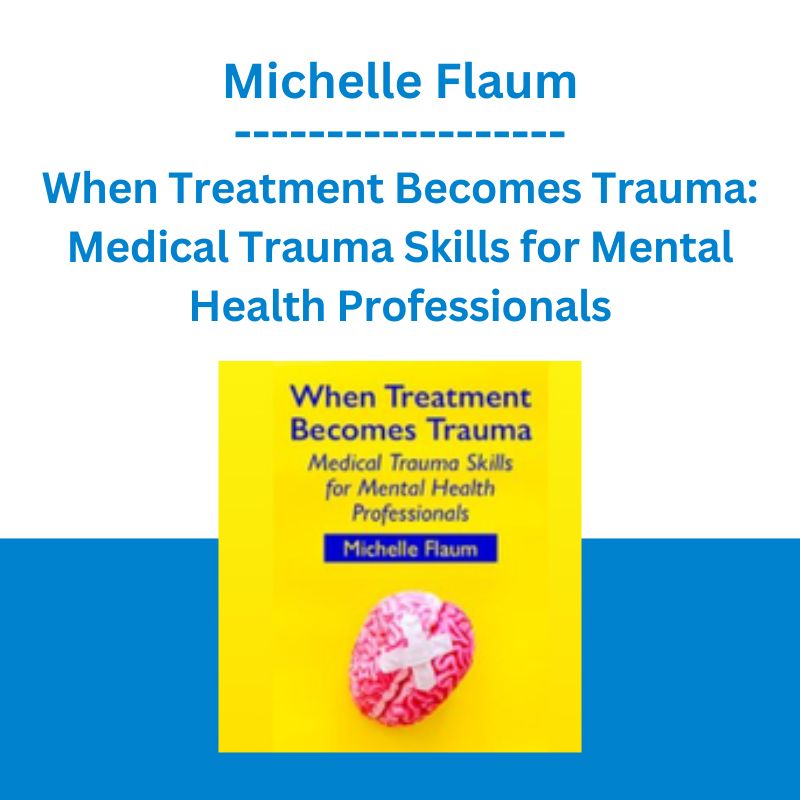*** Proof of Product ***
Exploring the Essential Features of “When Treatment Becomes Trauma: Medical Trauma Skills for Mental Health Professionals -Michelle Flaum”
The list of medical experiences that have the potential to be terrifying, disorienting, and life-altering goes on and on…
As a mental health professional, you are uniquely positioned to meet the complex needs of clients suffering the devastating effects of medical trauma – from PTSD, anxiety, depression, grief, and more.
- Join leading expert in medical trauma, Michelle Flaum, EdD, LPCC-S, DCMHS, for this dynamic training in which she’ll walk you step-by-step through what you need to know to confidently:
- Comprehensively assess your clients for medical trauma and related symptoms and impacts
- Engage narrative techniques and other interventions to help clients make meaning of their experiences
- Re-engage clients with the medical system they’ve begun avoiding and promote self-advocacy to decrease medical gaslighting
Speaker
Michelle Flaum, EdD, LPCC-S, DCMHS
Michelle Flaum, EdD, LPCC-S, DCMHS, is author of the first book dedicated solely to the topic of medical trauma, Managing the Psychological Impact of Medical Trauma: A Guide for Mental Health and Health Care Professionals and founder of the Certificate in Medical Trauma-Informed Care at Xavier University, which is the first training program of its kind worldwide. A Fellow of the American Mental Health Counselors Association, and Dual-Diplomate, Clinical Mental Health Counseling Specialist in Trauma Counseling and Integrated Behavioral Health Care Counseling, Dr. Flaum has worked with the California Maternal Quality Care Collaborative/Stanford University and The Council on Patient Safety in Women’s Healthcare to develop assessment tools to help clinicians provide improved quality of care for patients who experience medical trauma. She is a strong advocate for integrating mental health professionals into treatment teams to enhance the patient experience and improve patient care, and her assessment tools and protocols are used throughout the world. She is the medical trauma specialist and executive board member for Live the Pain, an international organization of professionals based in Tel Aviv, Israel working to bring innovative solutions to the management of pain. Additionally, Dr. Flaum has been featured throughout the media, including NPR’s All Things Considered, Doctor Radio on SiriusXM, Health Professional Radio, Refinery29, Social Work Today, Psychotherapy Networker, Counseling Today, Healthcentral.com, The Conversation and Elle Magazine. More information can be found at www.michelleflaum.com.
Speaker Disclosures:
Financial: Michelle Flaum maintains a private practice and has an employment relationship with Xavier University. She receives royalties as a published author. Michelle Flaum receives a speaking honorarium and recording royalties from PESI, Inc. She has no relevant financial relationship with ineligible organizations.
Non-financial: Michelle Flaum is the Co-Founder and Vice President of Ohio Association of Counselors in Private Practice. She serves on the editorial review board for the Nursing for Women’s Health. She is a member of the American Counseling Association, the American Mental Health Counselors Association, the International Society for Traumatic Stress Studies, and the Ohio Counseling Association.
Objectives
- Evaluate three impacts of medical trauma on mental health and their clinical implications.
- Assess clients’ experiences of medical trauma to inform clinical treatment interventions.
- Devise a treatment plan to alleviate mental health symptoms related to medical trauma.
Outline
Perfect storm: contagious illness, collective anxiety, and the healthcare landscape
- The complexity of medical trauma
- Double-bind of the provider-patient relationship
- Contextual factors: medical environment and communications
- Patient risk factors and vulnerabilities
Assessing the mental health impacts of medical trauma
- PTSD, anxiety, depression, substance use disorders: nuance and prevalence
- Secondary crises: ripple effects on relationships, work, finances, etc.
- Intake questions about health history to identify medical trauma and its impacts
- Practice Tool: The Secondary 7 Lifestyle Effects Inventory
Clinical techniques for working with medical trauma
- Modify existing treatments for clients with medical trauma
- Mind-body interventions to prepare clients for subsequent medical interventions
- Identify and manage medical avoidance: promote client advocacy for trauma-sensitive medical care
- Build protective factors and resiliency
- Practice Tool: Medical Mental Health Screening
Clinical Considerations
- Management of compassion fatigue and burnout
- Engaging medical providers and the client’s caregivers in the healing process
- Limitations of the research
Target Audience
- Counselors
- Social Workers
- Psychologists
- Psychiatrists
- Marriage & Family Therapists
- Addiction Counselors
- Other Mental Health Professionals
- Physicians
- Physician Assistants
- Nurse Practitioners
- Nurses
Please see the full list of alternative group-buy courses available here: https://lunacourse.com/shop/









